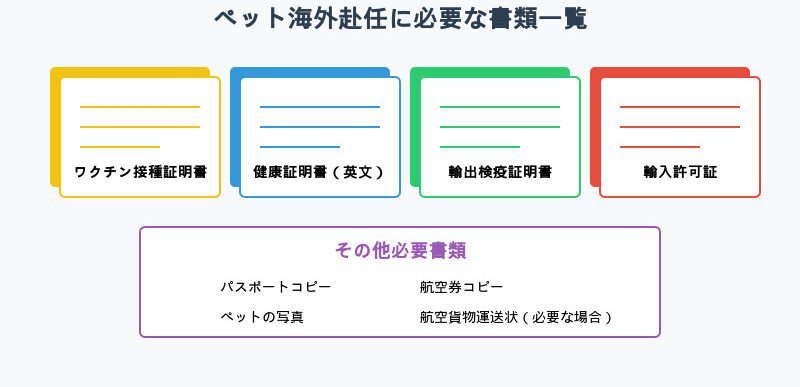Basic Steps for Pet Overseas Assignment
First, once you have decided on an overseas assignment, let's go over the basic steps you need to take before departure. You will need to fulfill both the procedures before leaving Japan and the entry requirements of each country.
It is important to plan in a step-by-step manner, including prior contact with the animal quarantine station and authorities in each country, preparation of necessary documents, and vaccination.
Pre-departure quarantine and vaccines

When taking pets overseas, they must undergo quarantine procedures in Japan and receive the necessary vaccinations before leaving the country. Microchipping and rabies vaccination are required in almost all countries.
In Japan, individual identification of pets is required upon departure from Japan, so pets should be fitted with an ISO-compliant microchip and have the number registered. Rabies vaccine must be given at least 30 days prior to travel and must be valid for at least one year.
For example, India and Indonesia require proof of rabies vaccination "at least 30 days prior to travel and within one year. In addition, additional combination vaccinations and parasite prophylaxis may be recommended for some countries.
Just prior to departure (usually within a week), have a medical examination by a veterinarian and have an English health certificate issued. To plan for these preparations, it is advisable to start at least 3-6 months in advance.
Depending on the conditions of the destination country, a rabies antibody titer test may be required, and it may take some time before the results are available (an antibody titer of 0.5 IU/ml or higher is required, and the titer is valid for two years, etc.). Since each country has different quarantine rules, it is essential to check the requirements for each destination country.
India is relatively flexible in terms of entry from non-rabies clean countries, but official permission must be obtained. On the other hand, Indonesia and Malaysia are highly vigilant against rabies and require antibody titer testing at designated laboratories and submission of additional documents in advance.
Check official information from the embassy or quarantine authorities in your destination country to ensure that you meet the required vaccines and tests.
The following article explains microchipping in detail.
▶︎All about microchips for dogs and cats: safety, benefits, and installation procedures
Required Documents and Application Procedures

The following documents are required when traveling abroad with a pet. It is recommended that you obtain all of these documents and prepare multiple copies immediately prior to your departure.
Pet Passport or Vaccination Certificate: A record of the pet's basic information and vaccination history. Although there is no official pet passport from Japan like in Europe,International Certificate (Vaccine Certificate)The following is the equivalent of the above. The rabies and mixed vaccine vaccination date and expiration date should be clearly indicated, and the veterinarian's signature and seal should be on the form.
Health Certificate (English): A health certificate issued by a veterinarian within 7 days (varies from country to country, as a general guideline, 5-10 days) prior to departure from Japan.Forms specified by the quarantine station."Or, you can have it written in English on an internationally accepted form. The information will include the pet's free of contagious diseases, vaccination status, microchip number, etc.
It is also required to have an export quarantine certificate issued at the animal quarantine station in Japan.
Export Quarantine Certificate (proof of export from Japan): This certificate is issued by the Japanese animal quarantine office and officially certifies that your pet meets the requirements to leave Japan. It is obtained by applying for an export inspection at the animal quarantine station at least 7 days prior to the planned date of travel and undergoing inspection on the same day.
This is an important document that must also be submitted upon entry into the destination country.
Import Permit (Import Permit): Depending on the destination country, the pet'sPrior Import Permitis required to enter the country. Without this permit, you will not be allowed to enter Indonesia or Malaysia.
Applications are filed with local government agencies (e.g., Department of Agriculture, Malaysia; Department of Livestock, Ministry of Agriculture, Indonesia), and it takes several weeks to several months to issue the certificate. It should be noted that in Malaysia, application must be made through a local corporation, and individuals cannot apply directly.
Other documents: A copy of the traveler's passport, a copy of the airline ticket (e-ticket), and a photograph of the pet may be requested. An Airway Bill is also required if the shipment is being sent as cargo.
In parallel with the preparation of documents, advance application procedures for each country will also be carried out. For example, in India, the Animal Quarantine Authority of India will send you the following documents at least 15 days prior to your trip.Import Permit (No Objection Certificate, NOC)must be obtained.
Indonesia also requires an import permit and advance declaration to the quarantine station several weeks before travel. The destination and application procedures differ from country to country, so please follow the instructions of each country well in advance.
If the documents are incomplete, there is a risk of refusal of acceptance or a lengthy mooring inspection upon entry into Japan. Also, keep in mind the registration procedures after arrival in the country.
In some countries and regions, there is an obligation to register your pet with the veterinary office or local government upon arrival. For example, in Malaysia, you may be required to register your dog's license with the local government in your area of residence, and there are also systems in place to provide proof of annual vaccinations to prevent rabies.
Follow the rules of the destination country and check locally if you need to register or license your pet's residency.
The following articles provide more information on pet entry into Indonesia and Malaysia.
▶︎What you need to know about taking your pet to Indonesia
Pet import restrictions in India, Indonesia, and Malaysia
The following is a detailed country-by-country explanation of the rules for accepting pets in India, Indonesia, and Malaysia, where there are particularly large numbers of expatriates. Each country has different regulations, so it is necessary to take measures in accordance with local laws.
Based on the latest information released by public agencies, let's take a look at the key points to safely and securely bring your pet into Japan.
Pet Quarantine Situation in India
Pet dogs and cats are allowed to enter India, but will be subject to document verification and inspection by the Animal Quarantine and Certification Service (AQCS) upon entry. As for the No Objection Certificate (NOC) that should be obtained in advance, as mentioned above, application should be made by 15 days prior to travel.
To obtain an NOC, the assignee is also required to submit documents indicating that he/she will be staying in India for an extended period of time (visa, work permit, etc.) and a sworn statement that the pet is a member of the family, not for commercial purposes.
In addition, proof of "no clinical symptoms" is required for major infectious diseases such as distemper, parvo, and leptospira in dogs, and pancopenia (feline distemper) in cats.
Pets are recommended to be microchipped, and in fact, Indian authorities assume that imported pets are identified with a microchip.
India is relatively flexible in terms of quarantine periods. As a rule, quarantine is waived if the required documents and health conditions are in order.
In most cases, properly vaccinated pets from other rabies-free countries (such as Japan) or countries with a low incidence of rabies will be allowed to enter Japan with only a simple health check by a veterinarian upon arrival.
In fact, it is rare for pets to be detained in quarantine facilities in India, and even in the unlikely event that they are placed in quarantine, they will be released after about 30 days (3 months at the maximum). However, if there are any deficiencies in the paperwork or if there is any doubt about the health condition of the pet, temporary custody (home quarantine, etc.) may be ordered.
Note also that, in principle, the number of pets brought into India is limited to two (more than that requires a separate DGFT import permit).
As entry restrictions, pets from rabies-endemic countries and pets brought into Japan for commercial purposes are prohibited. In principle, pets traveling alone without an accompanying person are also not permitted.
AQCS quarantine officers are stationed at major arrival airports (Delhi, Mumbai, Chennai, etc.), so upon arrival, go directly to the quarantine booth with your pet before baggage claim, present your NOC and health certificate, and follow instructions.
In India, pets must also be declared on the customs declaration form at the time of entry into the country, so do not forget to inform the officer that your pet will be accompanying you. In general, India can be said to be a pet-friendly country as long as procedures are in place.
The support of experienced movers and local agents will ensure a smooth entry into the country.
The following article provides more information on pet transportation in India.
Indonesia's pet import rules
Bringing pets into Indonesia is highly restricted and requires systematic preparation. In principle, the country imposes quarantine isolation on all dogs and cats upon arrival to prevent the influx of rabies into the country.
Before departure, an Import Permit must be obtained from the Department of Livestock Production under the Ministry of Agriculture of Indonesia. Generally, a local agent (pet transporter, etc.) is appointed to apply for the permit, and it takes about one month or more for the permit to be issued.
Documents required for application include a copy of the companion's passport, a photograph and description of the animal, an English-language veterinary certificate and vaccine record, and the results of a rabies antibody test. It is also required to give advance notice to the quarantine station at the airport where your pet is scheduled to arrive, approximately two days prior to the date of travel.
Vaccines required for entry into Indonesia areRabies (within 30 days to 1 year prior to travel), plus vaccinations against major diseases such as distemper, parvo, leptospira, and canine infectious hepatitis in dogs, and calicivirus and viral rhinotracheitis in cats are recommended.
In particular, a rabies titer test (Rabies Titer Test) is mandatory, and blood must be drawn and tested at an OIE-accredited institution within 3 to 6 months prior to travel to prove an antibody titer of 0.5 IU/ml or higher.
Pets are not allowed to enter the country if they are less than 90 days old, and pregnant animals are also not allowed to travel. Also, be sure to bring a health certificate issued by the government agency of the exporting country (in Japan, a certificate from the animal quarantine office).
Pets arriving in Indonesia must be quarantined in a quarantine facility for a minimum of 14 days after undergoing documentary examination and a health check by an airport animal quarantine officer upon entry.
In principle, quarantine is conducted at a government-designated facility in Jakarta (if the arrival airport is in Jakarta), and pets are checked in on the spot. The quarantine period is normally 14 days, but may be extended up to 21 days depending on circumstances.
During this period, the pet will undergo health observation and necessary tests (such as an additional rabies test), and if there are no problems, the pet will be handed over to its owner at the end of the period. In some areas, such as Bali, pets are not allowed to be brought into the country.
Bali, a popular tourist destination, aims to be a rabies-free zone and does not allow pets directly from overseas. Therefore, if your pet is to be transferred to Bali, it must first enter and be quarantined in Jakarta, and then be transported by land or a separate domestic flight.
Regulations vary by region within Indonesia, so it is also important to check which province your new post belongs to. Regarding prohibited pets, there are strict restrictions on bringing animals other than dogs and cats into Indonesia.
In particular, importation of exotic animals (birds, reptiles, primates, etc.) is basically not allowed and requires a special permit for academic research purposes. In addition, dogs that are considered dogfighting breeds or highly aggressive may be denied entry.
However, there is no officially published list of prohibited imports of specific breeds of dogs, so once a permit is granted, it does not matter what breed of dog is accepted. In any case, it is important to check in advance whether your pet is in violation of Indonesian regulations, as detailed pet information is submitted when obtaining an import permit.
The following article provides more information on pet transportation in Indonesia.
Pet Entry Procedures in Malaysia
It is possible to bring pets to Malaysia, but again, advance preparation and procedures are very important. In Malaysia, the procedures for bringing pets into Peninsular Malaysia (West Malaysia) and the procedures for bringing them into East Malaysia (Sabah, Sarawak, etc.) on the Borneo side may differ.
This section explains the procedures for bringing pets into West Malaysia, including Kuala Lumpur, which is a common destination for assignments. The first thing you need is an Import Permit issued by the Malaysian government.
This must be applied for through a local corporation or agent, and cannot be obtained by an individual through an embassy or other means. It takes about one to two months from application to issuance, so once you have decided on your assignment plan, you should promptly ask a local agent to apply for it.
The permit is valid for three months from the date of issue and becomes invalid if not entered within that period. Since the permit cannot be extended and must be reapplied for (at an additional cost) upon expiration, care must be taken to manage the travel schedule and expiration date.
Malaysia is not a rabies-free country and has strict standards for vaccines and inspections that must be prepared for prior to travel. The rabies vaccine must have been administered at least twice, the latest within one year prior to travel, and the animal must be at least 91 days old.
furthermoreRabies antibody titer test (FAVN test)The antibody titer must be proven to be 0.5 IU/ml or higher at The results of this test are valid for two years from the date of blood collection, so it is advisable to travel while the test is valid, taking into consideration if you plan to return home during your assignment.
In addition, proof of additional vaccinations such as distemper, parvo, and adenovirus for dogs, and triple combination (calicivirus, feline viral rhinotracheitis, and panco) for cats, should also be prepared. A health certificate (in English) dated within one week prior to departure is also required, and it must be confirmed that the microchip number and vaccine information are accurate.
For information on how to transport your pet,There are two ways to transport your baggage: either you can check it in as hand-carry baggage on the same aircraft as the passenger, or you can treat it as cargo and outsource its transportation to a specialized company. Generally, you can check in your baggage (or carry-on baggage) with the airline company.Many users find it easier and less expensive to take them as
However, since different airlines have different acceptance requirements, inform the airline at the time of booking that you will be traveling with your pet and check the cage size and weight restrictions. If your pet is allowed in the cabin, it should be placed in an appropriately sized pet carrier and stowed under the seat.
Pets should be placed in a kennel with sufficient space to stand and turn around, and a waterproof and breathable bottom. Even if pets are not allowed in carry-on baggage, many airlines will transport them safely in dedicated cargo compartments that are pressure- and temperature-controlled.
In any case, it is important to provide a crate that complies with the pet transport regulations set forth by IATA (International Air Transport Association). There are detailed standards for the size of the crate, including the animal's ability to stand up and change direction inside, and the crate's ability to be locked and sturdy.
Short-breed dogs and other pets should avoid traveling during the summer season, choose direct flights, and take other measures to reduce the burden on pets.
The procedure upon arrival in Malaysia is as follows Upon arrival at Kuala Lumpur International Airport, go to the Animal Quarantine (MAQIS) counter before immigration and customs.
There, you will submit the import permit, health certificate, vaccine certificate, and Japanese export certificate, and have your documents and microchip number checked by an official. If there are no problems, you will be allowed to enter Japan and proceed to customs clearance.
In most cases, pets from Japan and other rabies-preventive countries are returned on the same day, although in some cases a several-day mooring inspection may be indicated. Quarantine fees and handling charges (several thousand yen) must be paid and will be charged upon receipt of the pet.
You may also be required to report your health condition at the local veterinary office within 30 days of your arrival, so please follow local instructions.
It should also be noted that Malaysia has regulations on prohibited dog breeds for importation. Breeds banned by law include Akita, Tosa, Pit Bull type (Pit Bull Terrier), Neapolitan Mastiff, Dogo Argentino, Fila Brasileiro, and American Bulldog.
As a rule, these breeds of dogs are not allowed. Restricted breeds such as Dobermans, German Shepherds, Bull Terriers, and Bullmastiffs must be approved in advance by the Chief of Police of the State.
If you own an applicable breed of dog, please consult with a specialist before traveling to Japan to confirm the additional procedures required.
We have looked at the regulations by country above, and we hope that you have learned that advance preparation is the key to success in India, Indonesia, and Malaysia. Next, let's review some frequently asked questions and examples of problems at the time of entry and how to deal with them.
The following article provides more information on pet transportation in Malaysia.
Frequently Asked Questions and Trouble Stories
What kind of problems can actually occur when accompanying pets on overseas assignments? And how should we deal with them? Here are some examples of problems that novice pet owners tend to encounter and how to solve them in a Q&A format.
Q: What if I am told that my documents are incomplete and I cannot enter the country?
A: First, calm down and find out what documents are missing. Explain the situation to the quarantine officer or customs officer at the port of entry and ask if your pet can be placed in temporary custody until you can provide the missing documents.
In many countries, if the deficiencies are minor, additional documents can be submitted within a certain period of time and entry will be permitted. For example, if your rabies certificate has expired, you may be allowed to enter the country if you re-vaccinate and submit the certificate locally.
However, in the case of serious deficiencies (e.g., no import permit), entry may be denied and the pet may be at risk of deportation, so it is important to obtain professional confirmation in the advance preparation stage.
Q: What happens if the quarantine quarantine lasts longer than planned?
A: In Indonesia and other countries, the normal 14-day quarantine period may be extended depending on the situation. The most common reasons for extending the quarantine period are when it is determined that the pet's health condition requires observation, or when additional inspections are required due to incomplete documentation upon arrival.
In these cases, keep in close contact with the local quarantine staff and ask them to let you know how your pet is doing. Visitation may be limited during the quarantine period, and in some cases, you may be asked to leave a favorite blanket or toy with your pet to help reduce stress.
It is recommended to establish communication with the local quarantine station in advance through an agent.
Q: What if the airline refuses to accept my pet on the day of flight?
A: In rare cases, airlines may refuse to carry pets if the cargo hold cannot be secured due to excessively high temperatures or strikes. Also, if the kennel does not meet the regulations, the pet will not be allowed on board.
In such cases, alternative measures should be taken promptly. First, contact the airline to discuss transfer to the next flight or make arrangements for temporary storage. In some cases, we may even consider changing the travel schedule.
It is also a good idea to secure a reliable place to keep your pet in advance, such as a pet hotel or your parents' home, and be prepared to send your pet off at a later date in case you are the only one who travels to the destination. In any case, it is important to make final confirmation with the airline at least one day before boarding to prevent any problems on the day of the flight.
Q: What if my pet gets sick due to environmental changes after entering Japan?
A: After arriving in a new country after a long flight and quarantine measures, pets may experience poor health, such as loss of appetite and diarrhea. This is often due to stress and fatigue caused by the change in environment.
If possible, we recommend that you have a health check by a locally affiliated veterinarian immediately after your trip. Ask for guidance on preventive measures (e.g., mosquito-borne filarial prophylaxis) that are appropriate for the local climate and diseases.
Also, keep the pet at rest for a few days until it becomes accustomed to its living environment, and give it a sense of security with its usual blankets and toys. Gradually take the pet out for walks and otherwise help it adjust to the local environment, and most pets will regain their energy within a week or two.
In the unlikely event that symptoms do not improve, see a veterinarian as soon as possible.
In addition to these, there are various other problems that can be considered, such as "the pet kept making noises during transportation" or "pets are prohibited in the residence at the new destination. In the former case, consult with your veterinarian in advance about a light sedative such as Feligi, and in the latter case, ask a specialized agent to find a pet-friendly property.
If you have any concerns, do not hesitate to consult with a specialist and share possible issues and countermeasures.
Other frequently asked questions can be found below.

A must-see for those who are considering emigrating or traveling overseas with their pets! We will explain in detail the points to check various documents such as health certificates and other important information on quarantine procedures, and introduce safety measures to prevent the risk of deportation.
Advantages of using our services

Accompanying pets on overseas assignments presents many hurdles, but using our specialized services can be much safer and more convenient. Here are some of the advantages of this service.
Reliable Support: Experienced staff members provide one-stop support from the preparation of complicated documents to communication with quarantine agencies in each country. We provide support for export-import quarantine, from preparation of all necessary documents, application on your behalf, and reservations at the quarantine station prior to departure.
Even for first-time overseas assignments, professional accompaniment will ensure smooth preparation and prevent deficiencies and oversights.
Cooperation with local agents: We have reliable local partners in Indonesia, Malaysia, and other countries, who can assist you in obtaining import permits and dealing with entry into those countries.
For example, import permits that cannot be applied for in Malaysia without going through a local subsidiary can be obtained reliably through our network. Furthermore, our local staff will promptly follow up with you in the event of any problems or procedures at the quarantine station after arrival.
Official LINE Registration & Free Online Consultation: We have an official LINE account support system. By registering, you can easily ask questions and consult with our dedicated staff via chat, and smoothly request document checks and confirm progress.
We offer a free initial online consultation (video call), and our pet travel professionals will give you advice tailored to your individual situation. You can obtain the latest local information while you are in Japan, so we hope you will find this service useful in alleviating any concerns you may have before your trip.
If you use our services based on our expertise and extensive experience,"Pets and expatriates."It is not difficult to get your pet to the United States. We will do our best to support the comfortable and safe travel of your pet, a precious member of the family.
Sign up on our official line now to start your free consultation! Please feel free to contact us so that you can start your new life with your pet fully prepared. Our staff will help you and your pet travel in peace.
\ First of all, free consultation on line! / /

Consultation is completely free of charge.
Free online consultation
Weekends and holidays are also available.
Please share your experiences and opinions!

Do you have any experiences or questions about traveling abroad with your pet?
If you have actually experienced this, please share with us the points you took care of in your preparation and any problems you had while traveling. We also welcome questions from those who are thinking of traveling to Japan in the future.
Please feel free to comment on any concerns you may have, such as
Your comments will be of great help to others who are struggling with the same issues. Please share your thoughts and questions in the comments section below!
CONSULAR.EMBASSYOFINDONESIA.ORG - Consular Section of the Embassy of Indonesia, Information on Animal Quarantine
MAFF.GO.JP - Ministry of Agriculture, Forestry and Fisheries of Japan, Information on Animal Quarantine
AQCSINDIA.GOV.IN - Official site of Animal Quarantine and Certification Service of India
IATA.ORG - International Air Transport Association, Pet Transport Regulations
![Support for pets traveling and moving overseas|PetAir JPN [Official] for international transportation and quarantine procedures for dogs and cats Support for pets traveling and moving overseas|PetAir JPN [Official] for international transportation and quarantine procedures for dogs and cats](https://petair.jp/wp-content/uploads/2024/08/main_logo.png?1771048342)



Comment